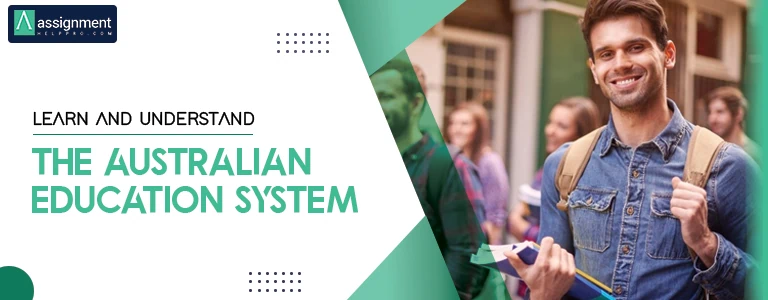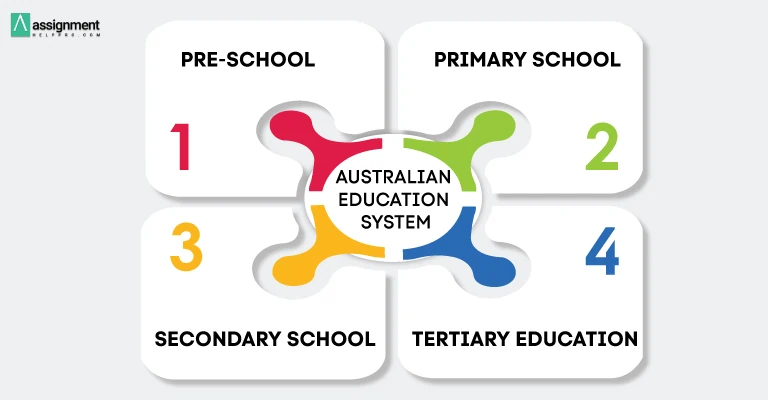Education is a vital part of everyone’s life. In order to provide quality education, each and every country in the world follows a certain education pattern. No matter whether you are a local or an overseas candidate, you must be aware of the education system of the country you are about to spend your academic life. If you are an international student who wishes to study in Australia, then continue reading this blog post. Here, you will get detailed information on the Australian Education System.

An Overview of the Australian Education System
In general, each nation has its own distinct educational system for teaching and updating the values, morals, knowledge, skills, and beliefs of different age groups. The Australian education system is unique in comparison to other nations.
In Australia, both the responsibility for regulation and the funding of education are entirely managed by the state. However, education funding is also provided by the Australian Federal Government. Australia has developed a standard National Curriculum, particularly for school education.
Australia’s education system is well-organized and structured. The Australian Department of Education and Training (DET) is in charge of ensuring that students receive an excellent education. Additionally, it facilitates Australians’ access to a variety of educational opportunities, including early childhood education, school education, postsecondary education, vocational education, international education, academic research, and training.
In Australia, education typically begins at age 5 or 6. English is used as the primary language of instruction in the Australian education system because it is the country’s official language. However, bilingual programs are also available at some schools.
Till now, we only had a brief look at Australia’s educational system. Next, let’s take a quick look at the Australian education system’s general structure, or the various levels of education, beginning with preschool.
Basic Structure of the Australian Education System

The Australian Education System is commonly structured as follows.
- Preschool
- Primary School
- Secondary School
- Tertiary Education
Preschool
Preschool is a highly popular education trend in many countries. Generally, kids from 3 to 5 years of age will be given preschool education. For them, preschools will typically stand as the first exposure to education.
Preschool education is a foundation for formal learning where kids below 5 years of age will be engaged in different activities such as painting, block construction, puzzle-solving, etc. Mainly, this level of education helps the students to develop their motor skills and social skills through the play-way method.
The ultimate role of preschools is to prepare kids for primary school by cultivating the basic and necessary skills needed for the kids to adapt to further education with utmost care and supervision.
In Australia, each state follows a different preschool approach. Some preschools operate separately as daycare and some preschools function within the primary school. But, on the whole, the country doesn’t count preschool education as schooling because, as per the Australian education system, preschool is different from regular primary school.
Preschools are not regulated by the Australian Government and are also not compulsory for the kids to complete their pre-schooling. Parents who wish to tune their children into the education process can admit their children to preschools.
Primary School
In Australia, primary school is considered the first stage of formal education. The kids of 6 years of age must compulsorily start their education by stepping into primary school.
The main role of primary schools is to teach the core subjects to students and to develop their numeracy and language skills. Also, it functions to provide fundamental knowledge to the children about the world around them.
Generally, the primary school curriculum lays a strong educational foundation for children between 6 and 12 years of age. However, in Australia, some states follow the concept of middle school and offer primary or foundation-level education to students from 7 to 10 years of age. However, this education concept differs from school to school.
In the Australian states that follow the middle school concept, students after completing middle school can enroll in secondary schools or high schools to complete years 10, 11, and 12.
In all the states and territories in Australia, the students should compulsorily complete grade 10 and participate in any training, employment, or full-time education until the age of 17 years.
Secondary School
The students can join secondary school after completing their education in primary school or middle school depending upon the school system in their states. Usually, students between 13 and 18 years of age attend secondary schools or high schools.
In secondary schools, the students will be given in-depth subject knowledge. The schools follow a standard curriculum and teach subjects like English, Maths, Science, Social Science, Citizenship, and Economics to enhance the knowledge of the students on various topics.
The students have the freedom of choice to select the subject they wish to pursue in the year or grades 11 and 12. On successful completion of the senior secondary school studies, the students will be awarded a Senior Secondary Certificate of Education.
Here is a gist of the schooling system in Australia.
Preschool: Daycare [Age: 3 to 5 years]
Primary School: Grade 1 to 6 (or) 1 to 7 [Age: 5/6 years to 12 years]
Secondary School: Grade 7 to 10 (or) 8 to 10 [Age: 13 years to 16 years]
Senior Secondary School: Grade or Year 11 and 12 [Age: 17 and 18 years]
Tertiary Education
After the senior secondary school education, the students can continue to pursue vocational and higher education courses or start working.
The education that involves higher education and vocational education and training is referred to as tertiary education.
Higher Education
Higher education involves studying at a technical college or university. In Australia, education providers such as colleges and other institutes that are recognized by the Australian Government offer various higher education degree courses.
All the organizations that offer higher educational qualifications in Australia must be registered by the Tertiary Education Quality and Standards Agency (TEQSA), which is Australia’s national quality assurance and regulatory agency for higher education.
The students must put a lot of effort into pursuing higher education courses rigorously for a specific period of years to become a graduate. The advantage of higher education is that it prepares students for future job prospects.
Australia is a perfect destination for higher education. It is the home of 40 public universities, 2 global universities, and 1 private university. Nearly 1100 institutions in Australia offer over 22,000 highly reputed courses in Arts, Design, Teaching, Medicine, Accounting, Law, Health and Science, Management, Engineering, and Technology.
Students after their secondary school education can join any higher education course of their choice and do their graduation, post-graduation, or research education from a reputed Australian University.
Vocational Education and Training (VET)
After graduating from high school, students are not required to pursue further education. They can also join Vocational Education and Training (VET) as an alternative.
In Australia, a program known as vocational education and training focuses more on teaching students the skills they need to succeed in the workplace. Higher education is different from VET. VET courses, on the other hand, place a greater emphasis on providing practical training than higher education generally does.
Students can choose from thousands of professional and certification courses through the VET program. Students can improve their skills in the field they want to work in by taking the VET course. Most importantly, enrolling in VET courses allows students without a college education to directly acquire job skills.
VET Registration and Entry Requirements
The VET courses are offered by accredited Australian educational bodies. The Registered Training Organization (RTO) is an education provider in Australia that delivers nationally recognized vocational education training and qualifications. The Australian Skills Quality Authority (ASQA) is the national regulator for Australia’s VET sector.
In Australia, the VET sector works in partnership between the government and industry. Also, the VET qualifications will be provided by private institutions and government institutions called Technical and Further Education (TAFE) institutions. In addition to higher education courses, some universities also provide VET courses in Australia.
Not just Australians, overseas students who wish to learn VET courses in Australia can also register themselves in their desired courses. However, the RTOs that enroll overseas students must also register themselves with the Australian Government Commonwealth Register of Institutions and Courses for Overseas Students (CRICOS). Through CRICOS, the Australian Government monitors the education offered to overseas students in Australia.
To join any VET course in Australia, the students must complete their study level equivalent to the years 10, 11, and 12. Some courses require work experience from the students. To join the arts and design VET courses, the students must submit their portfolios. Though the entry requirements for VET courses are common, each institute sticks to different admission and selection criteria.
Career Outcomes of VET
The VET courses mostly provide advanced diplomas, diplomas, or certifications. The students who complete VET can gain the essential skills and join the workforce for the first time, rejoin the workforce after a break, and also shift to a different career. Business, marketing, manufacturing, hospitality, sports, and tourism are some of the popular industries the VET students can look for.
VET courses are outcome-based, and they offer a flexible learning pathway for students. It trains the students in the industry context and offers different levels of certificates and qualifications such as Certificate I, II, III, and IV as well as Diploma and Advanced Diploma courses.
Mentioned below are the qualifications and the possible career outcomes for the VET courses in Australia.
- Competent Operator (Certificate I)
- Advanced operator (Certificate II)
- Qualified tradesperson or technician (Certificate III)
- Supervisor(Certificate IV)
- Para-professional(Diploma)
- Junior manager (Advanced Diploma)
The Australian Qualifications Framework (AQF)
The Australian Qualifications Framework is a national framework of qualifications in the school, VET, and higher education sectors in Australia. In simple terms, AQF is a national educational policy that defines the hierarchy of educational qualifications in Australia.
The AQF is designed and governed by the Australian government. The main purpose of AQF is to ensure a consistent educational title across the nation.
The Australian Qualification framework is classified into 10 levels. Each AQF level is briefly discussed below.
Level 1- Certificate I
Graduates at this level will have foundational knowledge and skills to perform initial work and will also be prepared for community involvement and further learning.
Duration of Study: 0.5 to 1 year
Skills:
The level-1 graduates will have cognitive, communication, and technical skills to
- Conduct defined routine activities
- Identify and record simple issues and problems
Level 2- Certificate II
Graduates at this level will have technical, factual, and procedural knowledge in a particular area of work along with necessary skills.
Duration of Study: 0.5 to 1 year
Skills:
The level-2 graduates will have basic cognitive, communication, and technical skills to apply appropriate tools, methods, materials, and processed information to
- Conduct defined activities
- Offer solutions to predictable problems
Level 3- Certificate III
Graduates at this level will have technical, factual, theoretical, and practical knowledge and skills in a particular area of work and learning.
Duration of Study: 1 to 2 years
Skills:
The level-3 graduates will have a wide range of cognitive, communication, and technical skills to apply appropriate tools, methods, materials, and information to
- Finish routine activities
- Offer solutions to both predictable and unpredictable problems
Level 4- Certificate IV
Graduates at this level will have a broad spectrum of technical, factual, theoretical, and practical knowledge and skills in a particular or broad area of work and learning.
Duration of Study: 0.5 to 2 years
Skills:
The level-4 graduates will have a wide range of cognitive, communication, and technical skills to apply appropriate tools, methods, materials, and information to
- Finish both the routine and non-routine activities
- Offer solutions to both predictable and unpredictable problems
Level 5- Diploma
Graduates at this level will have technical, theoretical, and specialized knowledge and skills in a particular or broad area of work and learning. With the skills acquired, the graduates can do skilled or paraprofessional work.
Duration of Study: 1 to 2 years
Skills:
The level-5 diploma graduates will have a wide range of cognitive, communication, and technical skills to apply technologies and methods to
- Analyze information to finish a range of activities
- Offer solutions to complex problems
- Transmit skills and necessary information to others
Level 6- Advanced Diploma, Associate Degree
Graduates at this level will have broad technical, and theoretical knowledge and skills in a particular or broad area of work and learning. With the skills acquired, the graduates can do highly skilled or paraprofessional work.
Duration of Study:1.5 to 2 years (Advanced Degree)& 2 years (Associate Degree)
Skills:
The graduates at this level will have a wide range of cognitive, communication, and technical skills to apply technologies and methods to
- Analyze information to finish a range of activities
- Interpret and provide solutions to unpredictable and complex problems
- Transmit skills and necessary information to others
Level 7- Bachelor’s Degree
Graduates at this level will have broad and coherent technical, and theoretical knowledge and skills in one or more disciplines of work or areas of practice.
Duration of Study: 3 to 4 years
Skills:
Bachelor’s degree graduates at this level will have cognitive, communication, and technical skills. Also, using those skills, they will select and apply technologies and methods to
- Analyze and evaluate information to finish a range of activities
- Analyze, interpret, and generate solutions to unpredictable and complex problems
- Transmit skills, ideas, knowledge, and other necessary information to others
Level 8- Bachelor Honors Degree, Graduate Diploma, Graduate Certificate
Graduates at this level will have advanced technical, and theoretical knowledge and skills in one or more disciplines of work or areas of practice.
Duration of Study:1 year(Bachelor Honors Degree), 1 to 2 years (Graduate Diploma) & 6 months to 1 year(Graduate Certificate)
Skills:
The graduates at this level will have advanced cognitive, communication, and technical skills, and they will apply technologies and methods to
- Critically analyze and evaluate information to finish a range of activities
- Analyze, interpret, and generate solutions to complex problems
- Transmit skills, ideas, knowledge, and other necessary information to others
Level 9- Master’s Degree
Graduates at this level will have advanced and specialized knowledge and skills for research in one or more disciplines of work or areas of practice.
Duration of Study: 3 to 4 years
Skills:
The graduates at this level will have specialized cognitive and technical skills to
- Critically analyze and synthesize complex problems, information, theories, and concepts
- Conduct research and apply the established theories into practice
- Transmit skills, ideas, knowledge, and other necessary information to non-specialist and specialist audiences
Level 10- Doctoral Degree
For the advancement of learning and professional practice, the graduates at this level will have a systematic and critical understanding of a complex study field and specialized research skills.
Duration of Study: 3 to 4 years
Skills:
The graduates at this level will have specialized cognitive, research, and technical skills in a specific discipline area to
- Involve in critical reflection, evaluation, and synthesis
- Create and implement research methodologies to extend and redefine existing knowledge or professional practice
- Promote new ideas to the community and peers
- Develop original knowledge to make a contribution to a discipline or an area of professional practice.
Conclusion
Hopefully, by now, you will have gained a good knowledge of the Australian Education System and the various levels involved in the AQF. When compared to other countries, the education system followed in Australia is considered the best. Moreover, along with education, some Australian universities provide scholarships and other educational benefits for international students. Not just high-quality education, Australia also provides good career opportunities for graduates and skilled people in various academic disciplines.
Remember, if you are a student who is pursuing your education in Australia, then during your course duration, you must submit numerous assignments, academic projects, research paper writing work, and case studies to obtain your graduation. But, to complete all your academic tasks precisely and on time, you must possess strong subject knowledge, good analytical skills, and excellent writing skills.
1. How is the education system in Australia?
Australia has a three-tiered education system: primary, secondary, and tertiary.
2. Is the Australian Education System the best?
Australia comes with one of the best education systems in the whole world and it has received a global reputation too. This education system aims at offering a very high-quality education to all its students.
3. Is education in Australia free?
It depends. Sometimes it is free for the school children. The residents of the state schools can take this benefit. Moving on to higher studies, government schools offer mostly free education to Australian citizens and permanent citizens.
4. Is Australian or UK education better?
Both are good, but if you need more options for streams and subjects, the UK should be your destination. In case you are looking for a flexible study system, Australia should be your choice.



